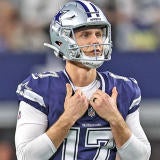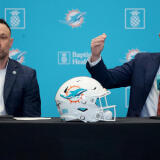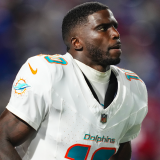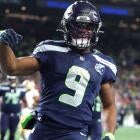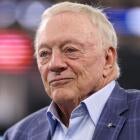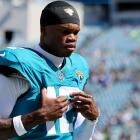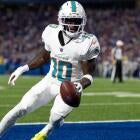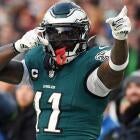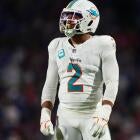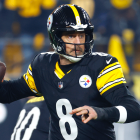Agent's Take: Best team money can buy at the end of 2021 season includes Tom Brady at quarterback
The end-of-season version has a totally different look with just 13 holdovers from September
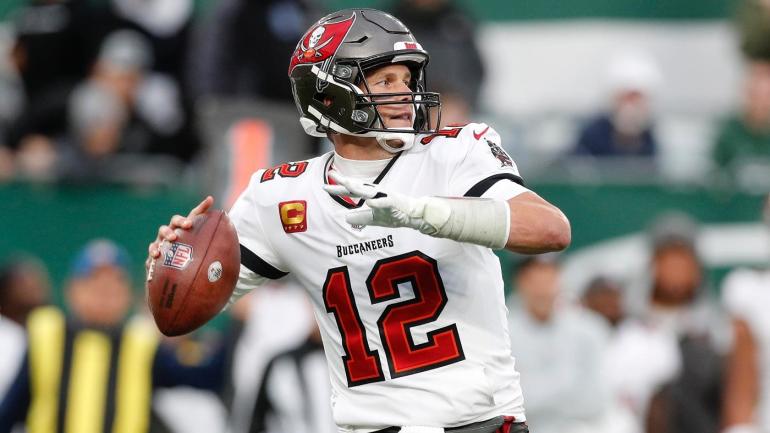
A 53-man roster under the salary cap using actual cap numbers with certain parameters, which are below, was assembled at the start of the season. The composition of the roster has changed dramatically in this end of the season version because considerable weight was given to 2021 performance.
Patrick Mahomes is no longer the choice at quarterback, although he was selected to the Pro Bowl for the fourth straight time. Injuries derailed wide receiver DeAndre Hopkins' and cornerback Jaire Alexander's seasons.
Parameters
1. The salary cap for the roster is $193.7 million. The actual NFL salary cap is $182.5 million for the 2021 league year. The number being used is the league's average adjusted salary cap, according to NFLPA data. Each NFL team's working salary cap varies largely because unused cap room can be carried over from one year to the next. For example, the Browns have the NFL's highest adjusted salary cap at $211.9 million largely thanks to carrying over a little less than $30.4 million of cap room, which is the most in the league. The Super Bowl LV champion Buccaneers have the lowest at $182.05 million, which is about $450,000 below the league-wide number. Situations like this typically occur when incentives earned during the previous season, that weren't counting on the cap, get accounted for without sufficient cap room carrying over from the prior year to make up the difference.
2. The NFL Draft is an essential element of roster building for NFL teams. It is here also. One player from each round of the 2021 draft must be on the roster. This means both Bengals wide receiver Ja'Marr Chase, the fifth overall pick, and Cowboys linebacker Micah Parsons, the 12th overall pick, can't be selected. A choice also had to be made between Cowboys cornerback Trevon Diggs and Colts running back Jonathan Taylor for the 2020 second-round pick.
The number requirement drops by one player for each year of the preceding three drafts (2018-2020). The limit of one player per round remains. Thus, only four 2018 draft picks are required. There's one other draft pick constraint. Only one 2017 first-round pick whose fifth-year option was exercised is allowed regardless of whether he signed a contract extension. Selecting one isn't a necessity.
3. The backups at each position are limited to players that aren't clear-cut established starters. This means players at positions where there's a "by-committee approach": usually running backs qualify. A backfield containing Dalvin Cook and Jonathan Taylor is prohibited since both are workhorse or every-down running backs. Those starting only because of an injury are also fair game as reserves. Young veterans, particularly second-year players solidifying a place in the lineup for the first time this season, are no longer allowed to be backups. Rookies can be either starters or backups regardless of actual playing time.
4. Choosing a player that was given a franchise or transition designation in 2021 is optional. However, only one player receiving a 2021 designation can be selected.
5. There are three starting cornerbacks instead of a traditional base defense (either 3-4 or 4-3) since five or more defensive backs are now used over 60% of the time in the NFL.
Here's the revamped team I assembled with some of my thoughts behind the selections. The 2021 salary cap number for each player is in parentheses. In cases where a player was elevated from the practice squad or signed off the street during the season, what would have been his full year cap number is being used. The full cap number is also in use for players traded during the season and when there's a split (lower salary when a player isn't on the 53-man roster) in a contract.
Long-range planning wasn't taken into account so worrying about future salary cap obligations, the amount of cap room that could be carried over, expiring contracts and drafting players that might develop into starters down the road wasn't necessary. Different choices would have been made if these aspects had been considerations.
Offensive starters
QB: Tom Brady, Buccaneers ($10,545,588)
The 44-year-old Brady continued to keep Father Time at bay with one of the best seasons of his 22-year NFL career. The ageless wonder threw for a league-leading (and career-high) 5,316 yards and 43 touchdown passes. His 67.5 completion percentage is the second-best mark in his career. Aaron Rodgers' $27,573,568 cap number made the choice easy.
RB: Jonathan Taylor, Colts ($1,785,983)
Taylor has easily been the league's best running back this season. He led the NFL with 1,811 rushing yards and 18 rushing touchdowns, while averaging 5.5 yards per carry. Taylor won the rushing title by 552 yards.
WR: Davante Adams, Packers ($16,537,500)
Adams is the one luxury item on the team. He's the only player with a cap number over $15 million. Adams set the Packers' single-season record for receiving yardage with 1,553 yards and broke his own team record for catches in a season with 123. He also had 11 receiving touchdowns.
WR: Cooper Kupp, Rams ($5,307,700)
Kupp had a season for the ages. He nearly broke the single-season record for receptions and receiving yards. Kupp's 145 receptions and 1,947 receiving yards are both second on the single-season list. He also topped the NFL with 16 receiving touchdowns. Kupp will spend significant time operating out of the slot since 65% of his receiving snaps have come from there, according to Pro Football Focus (PFF).
WR: Deebo Samuel, 49ers ($2,106,704)
The 2019 second-round pick emerged as one of the NFL's most dangerous offensive weapons this season. Samuel led the league with 18.2 yards per catch. He caught 77 passes for 1,405 yards with six touchdowns. Samuel was also a threat out of the backfield. The 49ers started utilizing Samuel in that capacity because of injuries at running back. He rushed for 365 yards on 59 carries and scored eight touchdowns on the ground.
TE: Mark Andrews, Ravens ($3,165,076)
Andrews had one of the finest seasons ever for a tight end. He led NFL tight ends with 107 receptions and 1,361 receiving yards. His nine touchdown catches tied for the league lead among tight ends.
LT: Trent Williams, 49ers ($8,193,153)
A top flight left tackle on a veteran contract with a cap number under $10 million was a rare commodity this season. The 33-year-old Williams arguably had his best NFL season after resetting the offensive tackle market at $23.01 million per year.
LG: Joel Bitonio, Browns ($8,164,324)
The Browns rewarded Bitonio with a three-year contract extension during the middle of the season, putting him at the top of the offensive guard salary hierarchy with the Chiefs' Joe Thuney at $16 million per year for a reason, even though he had another year left on his deal. He provides a great combination of run blocking and pass protection at left guard. Bitonio did a pretty good job playing left tackle in the two games Jedrick Wills missed while on the COVID-19 list.
C: Corey Linsley, Chargers ($6,605,500)
Linsley was given a five-year, $62.5 million contract with $26 million in guarantees to help stabilize and anchor the Chargers' offensive line. He didn't disappoint in that regard. Linsley didn't allow any sacks and only two quarterback hits this season.
RG: Zack Martin, Cowboys ($9,957,425)
Offensive line isn't quite the strength of the Cowboys anymore. Nonetheless, Martin remains the league standard for right guards.
RT: Tristan Wirfs, Buccaneers ($3,688,188)
Wirfs put himself in the league's best right tackle discussion as a rookie in 2020. Wirfs may have vaulted to the top of the list this season.
Defensive starters
Edge: T.J. Watt, Steelers ($8,118,694)
A training camp "hold in" because of a contract dispute that wasn't resolved until right before the regular season started didn't affect Watt's performance. The league's highest-paid non-quarterback at $28,002,750 per year tied the NFL single-season sack record. Watt had 22.5 sacks in 15 games.
DT: Aaron Donald, Rams ($14,399,700)
Donald remains the NFL's most disruptive force from the interior of a defensive line. His 97 quarterback pressures (combined sacks, quarterback hurries and quarterback hits) are the second most in the NFL, according to PFF. Donald has five consecutive seasons with double-digits sacks.
DT: Cameron Heyward, Steelers ($7,489,775)
Heyward is a run-stuffer with pass-rush ability. His 10 sacks are second among NFL interior defensive linemen this season.
Edge: Nick Bosa, 49ers ($9,260,734)
Bosa didn't show any ill effects from the left ACL tear he suffered in San Francisco's second game last season as the 2019 NFL Defensive Rookie of the Year was fourth in the NFL with 15.5 sacks.
LB: Darius Leonard, Colts ($8,228,108)
Leonard became the league's highest-paid off-ball linebacker at $19.7 million per year during the preseason. He's been a takeaway machine this season with a league-leading eight forced fumbles, three fumble recoveries and four interceptions, which were tied for the most among linebackers.
LB: DeVondre Campbell, Packers ($1,193,100)
Campbell has provided the Packers tremendous value. He didn't sign a one-year, $2 million deal with an additional $500,000 in playtime incentives until June because nobody was willing to meet his target price during the early parts of free agency. Campbell was named NFC Defensive Player of the Month for October.
CB: Jalen Ramsey, Rams ($9,702,200)
The NFL's only $20 million defensive back earned his fifth straight Pro Bowl berth this season. The Rams have been utilizing Ramsey a little differently by putting him in slot more than in the past.
CB: J.C. Jackson, Patriots ($3,384,825)
Jackson has had a tremendous contract year. He was second in the league this season with eight interceptions. Jackson's 22 interceptions are the NFL's most since the start of the 2019 season. He also had a league-leading 23 passes defensed. Jackson was named to his first Pro Bowl and was November's AFC Defensive Player of the Month.
CB: Darius Slay, Eagles ($6.61 million)
Slay bounced back from a subpar debut season in Philadelphia. He recently called 2021 his best season as a pro.
FS: Quandre Diggs, Seahawks ($3.625 million)
Diggs earned his second straight Pro Bowl berth. His five interceptions are tied for the league lead among safeties. Since Diggs made his Seahawks debut in Week 10 of the 2019 season, a couple of weeks after being traded from the Lions, his 13 interceptions are the most in the NFL for safeties.
SS: Derwin James, Chargers ($3,950,739)
James didn't miss a beat after injuries limited him to five games over the previous two seasons. The 2018 first-round pick regained the form that made him a Pro Bowler and All-Pro as a rookie. James is the Swiss Army knife of the secondary because of his versatility.
Specialists
K: Justin Tucker, Ravens ($3,487,733)
P: Bryan Anger, Cowboys ($993,000)
LS: Josh Harris, Falcons ($850,000)
KR: Braxton Berrios, Jets ($858,250)
PR: Berrios
Tucker is the most accurate kicker in NFL history connecting on 326 of 358 field goal attempts for a 91.1% conversion rate (minimum of 100 made). He led the NFL by connecting on 94.6% of his field goal attempts (35 of 37) and didn't miss any of his 32 extra point tries. Tucker also set the record for the longest field goal in NFL history at 66 yards this season. Anger had an NFL-best 44.6 yard net punting average. Berrios handles return duties. He led the NFL with 30.4 yards per kickoff return. He also averaged 13.4 yards per punt return. Harris is the NFC's long snapper in the Pro Bowl.
Reserves
QB: Gardner Minshew, Eagles ($850,000)
Minshew checks the two boxes necessary to be Brady's backup: cheap and starting experience. The 2019 sixth-round pick had started 20 of 23 NFL games he played prior to a preseason trade from the Jaguars. Minshew is arguably the league's best backup quarterback. He acquitted himself nicely in his two starts this season.
RB: Tony Pollard, Cowboys ($1,025,282)
RB: Chase Edmonds, Cardinals ($1,040,789)
RB: D'Ernest Johnson, Browns ($858,525)
RB: Kyle Juszczyk, 49ers ($2,256,421)
Edmonds and Pollard will both be utilized as the third-down back. Pollard will get the bulk of carries in relief of Taylor. The 2019 fourth-round pick was Dallas' most consistent running back this season. Edmonds was on pace for over 60 receptions before an ankle injury in Week 9 sidelined him for five games. Edmonds also averaged 5.1 yards per carry in a timeshare with James Conner. Johnson took advantage of injuries to Kareem Hunt. He gained 534 yards on 100 carries, while going over the 100-yard mark twice this season. Juszczyk is by far the NFL's highest-paid fullback at $5.4 million per year. He's also the most utilized. Juszczyk led all fullbacks in receptions (30) and offensive playtime (55.91%).
WR: Gabriel Davis, Bills ($963,643)
WR: Cedrick Wilson, Cowboys ($2,190,700)
WR: Braxton Berrios, Jets ($858,250)
Davis was relegated to Buffalo's fourth wide receiver with Emmanuel Sanders' arrival but remained productive (35 catches for 549 yards with six touchdowns). Wilson produced two 100-yard receiving games when the Cowboys were shorthanded at wide receiver because of injuries. Berrios' primary contribution will be returning kicks, although he caught 46 passes for 431 yards. He'll be an option in the slot.
TE: Pat Freiermuth, Steelers ($1,099,408)
TE: Marcedes Lewis, Packers ($2,342,647)
Freiermuth, a 2021 second-round pick, quickly became Pittsburgh's starting tight end. Lewis functions primarily as a blocker.
OL: Cornelius Lucas, Washington Football Team ($2,087,700)
OL: Michael Onwenu, Patriots ($819,153)
OL: Trey Smith, Chiefs ($694,701)
OL: Evan Brown, Lions ($927,425)
The offensive line depth is a mix of experience and youth. Lucas is the swing tackle. There wasn't much of a drop off when right tackle Samuel Cosmi was injured. Onwenu, a 2020 sixth-round pick, became New England's sixth lineman when Trent Brown returned from injury to right tackle. Onwenu was originally slated to be the left guard but the Patriots stuck with Ted Karras, who took over for him while he was filling in for Brown. Smith, a 2021 sixth-round pick, has been one of the biggest steals of the NFL draft. Brown, a 2018 undrafted free agent, performed capably once the Lions lost Pro Bowl center Frank Ragnow to a toe injury in October.
Edge: Trevis Gipson, Bears ($869,393)
Edge: Jonathon Cooper, Broncos ($688,678)
Khalil Mack's season-ending foot injury surgery in November opened the door for Gipson, a 2020 fifth-round pick, to have a career-high seven sacks. Cooper, a 2021 seventh-round pick, flashed potential once Von Miller was traded to the Rams.
DT: Osa Odighizuwa, Cowboys ($914,391)
DT: Taylor Stallworth, Colts ($926,600)
Odighizuwa, a 2021 third-round pick, had 41 quarterback pressures this season. Stallworth was thought to be just a run stuffer but showed some pass-rush ability with extended playing time late in the season.
LB: Micah Parsons, Cowboys ($3,108,252)
LB: Azeez Al-Shaair, 49ers ($863,525)
LB: Frankie Luvu, Panthers ($1,108,535)
LB: Mack Wilson, Browns ($858,525)
LB: Markus Bailey, Bengals ($814,789)
Parsons, the presumptive 2021 NFL Defensive Rookie of the Year, will essentially be the 12th defensive starter. He'll rush the passer from inside and out in addition to playing linebacker. Parsons' 13 sacks were sixth in the NFL this season. Niners starting weakside linebacker Dre Greenlaw missed most of the season with a groin injury. Greenlaw may have lost his starting job to Al-Shaair when both are healthy. Bailey's, Luvu's and Wilson's primary contributions will be on special teams. Luvu closed the season on a high note with a career-high nine tackles against the Saints in Week 17. Bailey didn't seem out of place when he received his first extensive playtime in his two-year NFL career due to middle linebacker Logan Wilson's shoulder injury.
CB: Rasul Douglas, Packers ($850,000)
CB: Nate Hobbs, Raiders ($738,868)
CB: A.J. Green, Browns (668,525)
Douglas has had a remarkable turnaround this season. He was released by the Raiders in the preseason and quickly signed by the Texans. Once the Texans released him, he was on the Cardinals' practice squad until the Packers signed him for minimum salary after Jaire Alexander got hurt. Douglas has had a knack for big plays in his 12 games with the Packers this season. He's picked off five passes and returned two of the interceptions for touchdowns. Hobbs' impressive training camp led to him becoming a surprise contributor for the Raiders. The 2021 fifth-round pick is an All-Rookie team candidate. Green was better than expected in coverage during his two starts to end the season.
S: DeAndre Houston-Carson, Bears ($992,725)
S: Camryn Bynum, Vikings ($842,018)
Houston-Carson was known primarily for his special teams play before this season. His 51 tackles are eight more than he had in his five previous NFL seasons. Minnesota's 2021 fourth-round pick Bynum might the heir apparent to free safety Xavier Woods, who is headed to free agency.
Tale of the tape
- Total salary cap room used (53 players): $189,579,607
- Remaining salary cap room: $4,120,393
- Offense (25 players): $94,041,185
- Defense (25 players): $90,207,689
- Specialists (3 players): $5,330,733
Positional salary breakdown
(Salary cap percentage in parentheses)
QB: $11,395,588 (5.88%)
RB: $6.967 million (3.6%)
WR: $27,964,497 (14.44%)
TE: $6,606,531 (3.41%)
OL: $41,107,569 (21.22%)
DE: $18,937,499 (9.78%)
DT: $23,730,466 (12.25%)
LB: $16,174,824 (8.35%)
CB: $21,954,418 (11.33%)
S: $9,410,482 (4.86%)
Final thoughts
All of the cap room isn't being used. There's a little over $1 million to spare after leaving room for a full practice squad of 16 players (approximately $3 million).
There is a slightly greater allocation of cap resources to offense because of the emphasis placed on the offensive line and splurging for Adams at wide receiver. Titans running back Derrick Henry was on his way to his third straight rushing title until breaking his right foot eight games into the season. A healthy Henry wouldn't have been a consideration because his $13,503,025 cap number is almost twice as much as the cap resources allocated to the running backs. The collective cap numbers for the tight end group are less than perennial All-Pro Travis Kelce's $7,605,882 cap hit with the Chiefs.
There are just 13 holdovers from the original 2021 team. None of the starting offensive skill position players are the same. The most continuity is in the trenches. Three starters remain on both the offensive (Linsley, Williams, Wirfs) and defensive lines (Bosa, Donald, Heyward).
The Cowboys lead the way with six players. The Packers and 49ers have four and five players, respectively. The Titans are the only playoff team that isn't represented. The Dolphins, Giants, Jaguars, Saints and Texans were also shut out.

